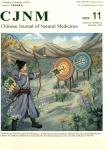Hepatoprotective activity of Gentiana veitchiorum Hemsl. against against carbon tetrachloride-induced hepatotoxicity in mice
Hepatoprotective activity of Gentiana veitchiorum Hemsl. against against carbon tetrachloride-induced hepatotoxicity in mice作者机构:Ethnic Pharmaceutical Institute of Southwest University for Nationalities State Key Laboratory for Quality Research of Chinese Medicines Macao University of Science and Technology
出 版 物:《Chinese Journal of Natural Medicines》 (中国天然药物(英文版))
年 卷 期:2014年第12卷第7期
页 面:488-494页
核心收录:
学科分类:1007[医学-药学(可授医学、理学学位)] 1006[医学-中西医结合] 100706[医学-药理学] 100602[医学-中西医结合临床] 10[医学]
基 金:supported by the National KeyTechnology R&D Program in the 12th Five year Plan of China(No.2012BAI27B07) the Macao Science and Technology Development Fund(No.073/2011/A3)
主 题:Gentiana veitchiorum Hepatoprotective effect Antioxidant enzymes Western blot
摘 要:AIM: To study the hepatoprotective effect of methanol extract of Gentiana veitchiorum(MGV) against CCl4-induced oxidative stress and liver injury in mice. METHOD: The acute hepatic model was developed by injection of 20% CCl4 in mice. ICR mice were divided into six groups, including control, CCl4, CCl4+ silymarin, and CCl4+ MGV(100, 200, and 400 mg·kg–1) groups. Hepatic enzymes including AST, ALT and ALP levels in serum, and antioxidant enzymes, including SOD, CAT and GPX activity in liver tissue, were determined. Histopathological examination and Western blot analysis were performed. RESULTS: Oral administration of MGV at 200 and 400 mg·kg–1 for 15 days dose-dependently inhibited the serum elevations of AST, ALT, and ALP, and recovered the reduction of SOD, CAT, and GPX in liver tissue. Hematoxylin and eosin staining examination performed in liver tissues suggested that MGV treatment ameliorated histopathological changes in CCl4-induced mice. Western blotting analysis implied that MGV increased HO-1 expression and recovered TNF-α alternation. CONCLUSION: G. veitchiorum can protect the liver against CCl4-induced damage in mice, and this hepatoprotective effect was due at least in part to its ability through scavenging CCl4-associated free radical activities. The study provided in vivo evidence that G. veitchiorum can be used as a safe, cheap, and effective agent to reduce acute liver damage, supporting its folk medicine use.



